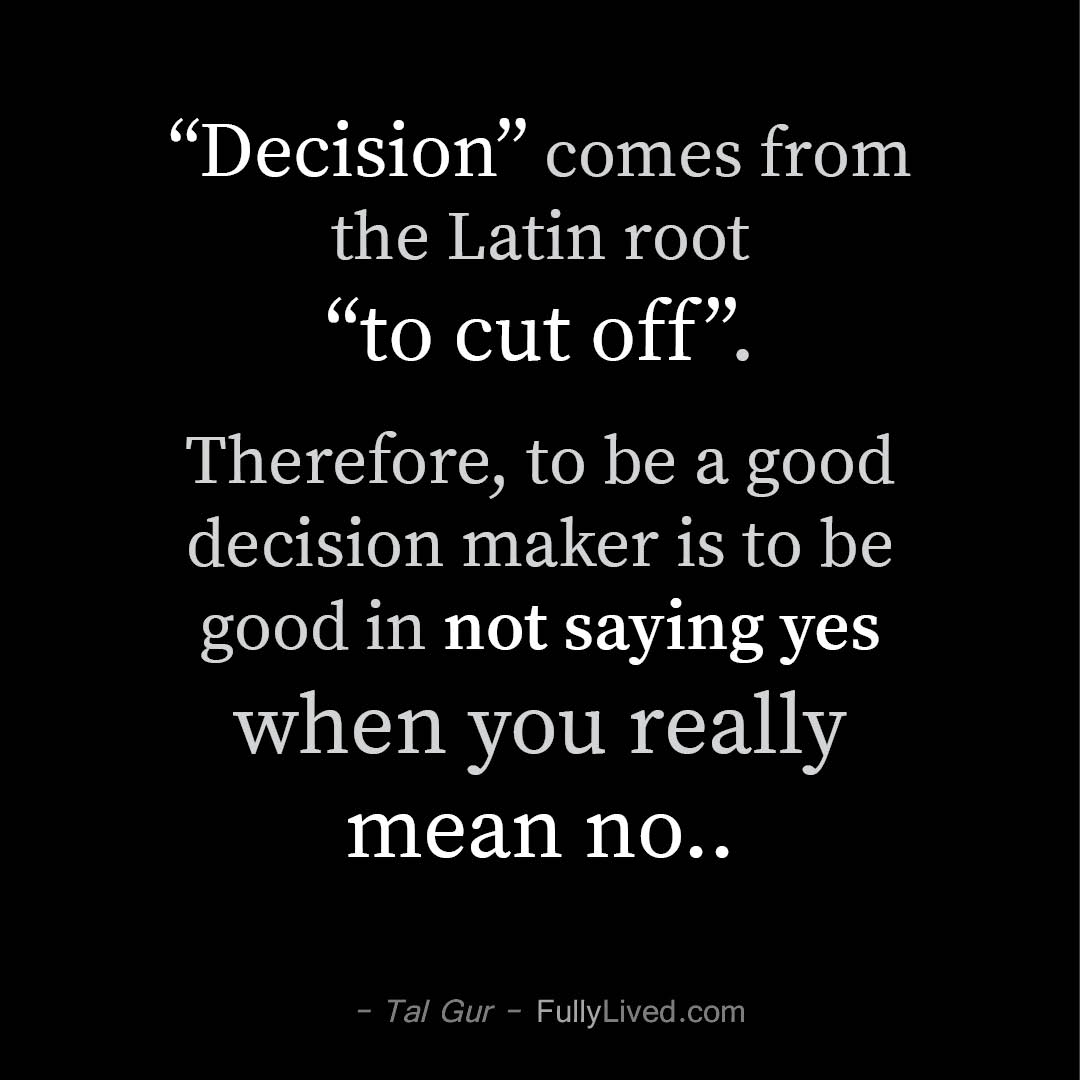Decision comes from the Latin “to cut off”. Therefore, to be a good decision maker is to be good in not saying yes when you really mean no..
Imagine yourself standing at a crossroads, a pair of scissors in your hand. Each decision you make is like a precise cut through the fabric of your life, shaping it into something unique, something only you can create. But here's the catch: not every cut leads to a masterpiece. Sometimes, saying "yes" when you really mean "no" is like snipping away at the wrong thread, unraveling the very fabric of your existence.
Think of it this way: life is like a quilt, made up of countless patches of experiences, memories, and choices. Each decision you make is a stitch, binding those patches together. Now, imagine if you were to haphazardly cut through the fabric without considering the consequences. The quilt would fray, the seams would unravel, and what was once a beautiful tapestry would be reduced to a pile of disconnected threads.
To truly excel at decision-making is to wield your scissors with finesse, to cut away the excess without damaging the integrity of the whole. It's about knowing when to say "no" to opportunities that don't align with your values, goals, or well-being. Just as a skilled tailor carefully selects the fabric for a garment, you must carefully select the choices that will shape your life.
But why is it so hard to say "no" when we really mean it? Perhaps it's because we fear missing out, or because we don't want to disappoint others. We convince ourselves that saying "yes" is easier than dealing with the discomfort of rejection or confrontation. Yet, every time we say "yes" to something that doesn't serve us, we're essentially cutting away at our own happiness, piece by piece.
Imagine you're at a buffet, faced with a smorgasbord of options. Just because everything looks appetizing doesn't mean you should pile your plate high with everything in sight. It's about making deliberate choices, selecting only the dishes that truly tantalize your taste buds. In the same way, life presents us with a buffet of opportunities, but it's up to us to discern which ones will nourish our soul and which ones will leave us feeling overstuffed and unsatisfied.
So how can we become better decision-makers, adept at wielding our scissors with precision? It starts with self-awareness. Take the time to reflect on your values, priorities, and long-term goals. When faced with a decision, ask yourself: does this align with who I am and where I want to go? Will saying "yes" to this opportunity bring me closer to my dreams, or will it lead me down a detour?
Additionally, practice setting boundaries. Just as a gardener prunes away dead branches to encourage new growth, learn to trim away the commitments, relationships, and obligations that no longer serve you. Saying "no" doesn't make you selfish; it's an act of self-preservation, a declaration that your time and energy are valuable and finite.
Remember, every decision you make is a reflection of who you are and what you stand for. By honing your decision-making skills, by learning to say "no" when you really mean it, you're not just cutting off options – you're sculpting a life that's true to yourself, one deliberate choice at a time.
So, ask yourself: What can I say "no" to today that will allow me to say a bigger "yes" to my dreams tomorrow?
*To obtain more inspiration and motivation to achieve your goals, you definitely want to check out my extensive list of growth goals. This page contains SMART goal ideas that can help you establish new aspirations and attain greater heights in your personal growth journey. I utilized this page myself to create my own list of 100 life goals, which I dedicated a decade to pursuing.
Chief Editor
 Tal Gur is an author, founder, and impact-driven entrepreneur at heart. After trading his daily grind for a life of his own daring design, he spent a decade pursuing 100 major life goals around the globe. His journey and most recent book, The Art of Fully Living, has led him to found Elevate Society.
Tal Gur is an author, founder, and impact-driven entrepreneur at heart. After trading his daily grind for a life of his own daring design, he spent a decade pursuing 100 major life goals around the globe. His journey and most recent book, The Art of Fully Living, has led him to found Elevate Society.























